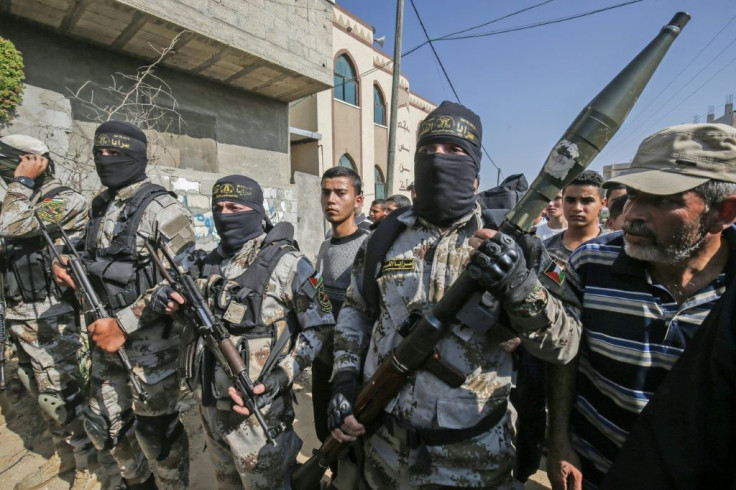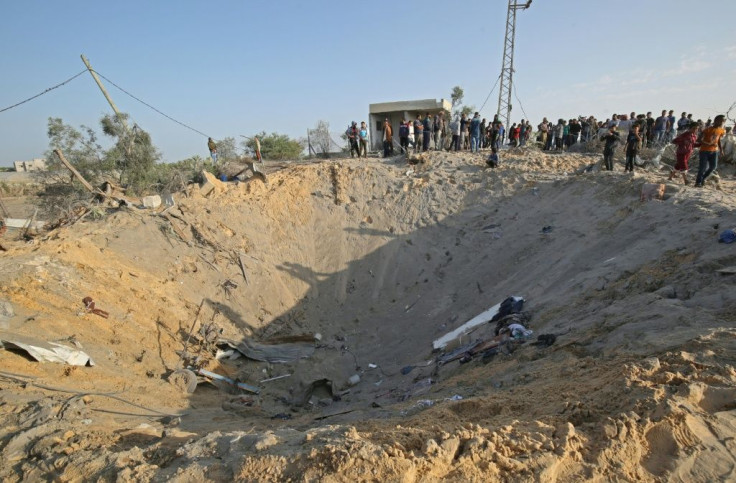When Hamas Is Not In Israel's Sights

For the first time in more than a decade, Israeli forces have bombed Gaza without targeting Hamas.
But this spells a tough choice for the Islamist movement, between heeding calls to join the fighting, and its desire to maintain its truce with Israel.
Before dawn on Tuesday, Israeli forces struck an apartment in the northern Gaza Strip, killing Baha Abu al-Ata and his wife Asma, who died immediately.
Ata was not a commander of Hamas, which has de facto control over the Gaza Strip, a territory of some two million people that has fought three wars with Israel since 2008.
Rather, he was one of the leaders of Islamic Jihad, Gaza's other major armed Islamist group, considered by Israel as more radical but less well armed than Hamas, and as a proxy militia of its archenemy Iran.
"Throughout the operation, we of course distinguished between Hamas and Islamic Jihad," said Israeli army spokesman Jonathan Conricus, after a ceasefire early Thursday ended 50 hours of clashes.
The tit-for-tat exchange saw 450 rockets launched at Israel and 34 people killed in Gaza.
"All of our operations were measured, proportionate and focussed only on military assets belonging to Islamic Jihad," Conricus said.
Earlier, an Israeli official said Ata was "responsible for almost all the attacks coming out of Gaza for the last six to seven months".
One of these attacks especially embittered Israeli Prime Minister Benjamin Netanyahu.
In September, a few days before a general election, Netanyahu was campaigning in the coastal city of Ashdod when rocket fire forced him to leave the scene.
The strike came from Gaza and was believed to have been ordered by Ata.
Hamas at the time remained silent, apparently unwilling to endanger its truce with Israel.
The deal, negotiated under the aegis of the UN, Egypt and Qatar, promises, among other things, millions of dollars in aid to enter impoverished Gaza every month.

"The situation is not new, we have had the same kind of a wave of violence many times," said Ronni Shaked of the Harry Truman Research Institute for Peace in Jerusalem.
"The only thing that's new is that Israel for the first time is not firing against Hamas, not charging Hamas with the responsibility of what is happening there, not fighting against the people of Gaza but firing just against the Islamic Jihad."
Shaked said that before launching its military operation against Ata, Israel had "some indications that Hamas is not going to participate in this wave of violence".
But Hamas "faces a dilemma," according to Jamal al-Fadhi, a professor of political science at Gaza University.
On the one hand "it wants to satisfy the mediators and respect the truce with Israel", he said.
On the other hand, "the street and other (Palestinian) factions are urging Hamas" to defend Gaza.
On Wednesday, Hamas signed a communique for a Palestinian "resistance" rally in Gaza which stressed it would not "remain silent" in the face of Israeli attacks.
"But at the same time we believe that managing the relationship with the occupation has to consider different and complicated contexts," senior Hamas official Bassem Naim told AFP.
"Therefore sometimes we have to restrain our response, mainly because of Palestinian interest."
In an interview with Lebanon's Al-Mayadeen television, Islamic Jihad secretary general Ziad al-Nakhala said his group made the decision to attack Israel on its own.
"Islamic Jihad is capable of managing the battle alone. We will not ask our allies to intervene," he said.
In Israel, many people have called for even harder strikes against Islamic Jihad, which is hostile to a truce with the Jewish state.
Islamic Jihad is "very, very dangerous to Israel exactly as ISIS has been to Europe," said Shaked, referring to the Islamic State militant group.
"But the minute we are going to finish this round, it is just a time out until next time. And when is next time? In two weeks, in one month, in two months?"
© Copyright AFP 2024. All rights reserved.





















